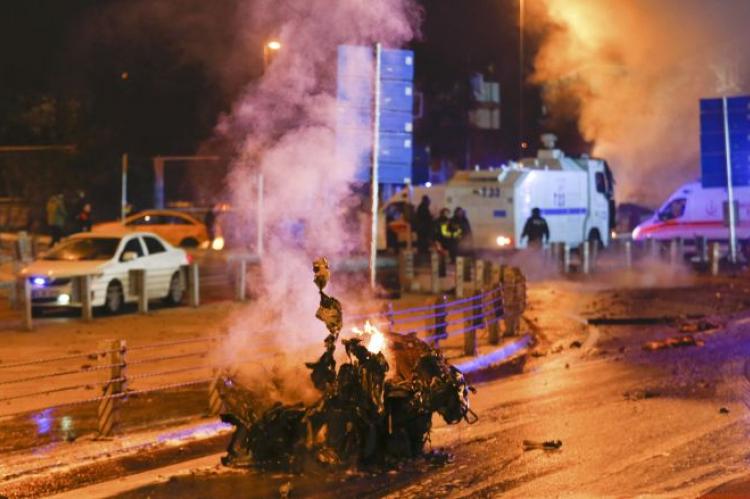Claim: Istanbul bomber unknown
2016-12-16 11:43 GMT
Posted in:
Independent argues that organisation between twin bombing in Istanbul is unknown
On 11 December 2016, Patrick Cockburn wrote in the Independent that the organisation responsible for the 10 December 2016 twin bombing in Istanbul is unknown. Casting doubt on the Turkish government’s attribution of the attack to the outlawed Kurdistan Workers’ Party (PKK), Cockburn hints that the Turkish government may be blaming the PKK at the expense of other terrorist organisations. However, the Independent published Cockburn’s article on the same day that a PKK front organization formally claimed responsibility for the attack which left over 40 people dead.1
Cockburn, by referring to the PKK as ‘the Kurds,’ falls into the trap of conflating the actions of the PKK with Turkey’s Kurdish population as a whole. Turkish citizens of Kurdish origin remain prominent in all sections of society and are represented in both the government and the parliament. As Fact-Checking Turkey has previously noted, Turkish citizens of Kurdish origin are scattered all over Turkey, with an estimated 14 to 22.5 million Kurds living in various parts of the country. 17.5 percent of the total Kurdish population resides in Istanbul alone.2
Developing his thesis that Turkish President Recep Tayyip Erdogan personally created the conditions “under which terrorism has become a permanent feature of Turkish life,” Cockburn overlooks the fact that PKK terrorism has been a constant in Turkish life since 1984. He furthermore neglects mentioning that the annulment of the most recent ceasefire was formally announced by the Kurdistan Communities Union (KCK), the PKK's umbrella group, on 11 July 2015.3 Similarly, a leading KCK figure, Bese Hozat, wrote on July 15, 2015 in the PKK-aligned Ozgur Gundem newspaper that the present political situation in Turkey necessitated a "revolutionary public war".4
Cockburn continues by claiming that areas in the Kurdish-majority southeast of Turkey have been “shelled and bulldozed into heaps of rubble." However, it must be borne in mind that military operations in Turkey’s southeastern regions began in response to an upsurge in violent PKK activity following the collapse of peace efforts conducted by the Turkish government. The PKK conducted armed attacks and carried out missile strikes against security forces. PKK-affiliated groups moved to take control of certain residential areas and declared what they call “self-rule.” To prevent security forces from entering neighborhoods, the Patriotic Revolutionary Youth Movement (YDG-H), the PKK’s urban youth branch, dug trenches, erected barricades and booby-trapped buildings. All of these activities resulted in severe damage to infrastructure, which the Turkish government has sought to alleviate with offers of financial compensation to homeowners.5 It is notable that security forces took measures to establish a corridor to safely extract civilians during security operations.6 However, it was reported that the PKK did not permit civilians to leave security zones.7
The article further claims that Turkey’s intervention into northern Syria is aimed primarily at “the Kurds.” The purpose of Turkey’s intervention into Syria is double-pronged. It is aimed at both curbing the spread of DAESH and at preventing the formation of a PKK-led state on Turkey’s southern border. A chronology of the operation records that the Turkish army was engaged in serious clashes with DAESH. The necessity of Turkey’s intervention into northern Syria is evident by virtue of the fact that earlier this year PKK suicide bombs in March,8 and February9 left over 50 people dead. The attacks were conducted by PKK members believed to have undergone training at camps in Syria.[17] Cockburn overlooks these attacks while stating that the deadliest attacks in recent months have been the work of DAESH alone.
Continuing with his article, Cockburn claims that Turkish President Recep Tayyip Erdogan “wields dictatorial powers and Turkey’s shift towards becoming an authoritarian state using arbitrary powers is well under way.” Contrary to this claim, both the on going judicial investigations into the 15 July coup attempt and the present state of emergency are in line with the law as stipulated by the relevant articles of the constitution,10 and are subject to periodic parliamentary approval.11 The extension of the state of emergency was likewise backed by the opposition Nationalist Movement Party (MHP),12 and by Turkey's National Security Council (MGK), a body comprised of representatives of the government and branches of Turkey's security and military apparatus.
- 1. http://www.dailysabah.com/war-on-terror/2016/12/11/pkk-suicide-team-tak-...
- 2. http://factcheckingturkey.com/kurdish-issue/claim-turkey-seeks-cleaning-...
- 3. https://t24.com.tr/haber/kck-ateskesin-bittigini-acikladi-bundan-sonra-t...
- 4. http://www.ozgur-gundem.com/yazi/133642/yeni-surec-devrimci-halk-savasi-...
- 5. http://www.emlaklansman.com/konut-projeleri/diyarbakir-surdaki-ev-sahipl...
- 6. http://www.ensonhaber.com/diyarbakirda-siviller-icin-koridor-acildi-2016...
- 7. http://www.karar.com/gundem-haberleri/pkklilar-diyarbakirda-yasli-cifte-...
- 8. http://www.dailysabah.com/war-on-terror/2016/03/17/pkk-linked-tak-claims...
- 9. http://www.hurriyetdailynews.com/ankara-bomber-infiltrated-turkey-with-f...
- 10. http://file.setav.org/Files/Pdf/20160809162358_the-declaration-of-the-st...
- 11. http://www.dailysabah.com/legislation/2016/07/21/turkeys-parliament-form...
- 12. http://www.dailysabah.com/war-on-terror/2016/09/30/opposition-leader-bac...



